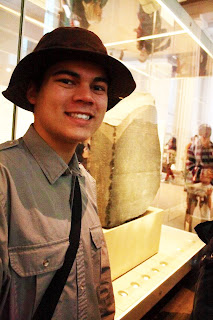 Right in the wake of a failed Snapchat takeover bid,
the M&A folks at Facebook are the toast of the business world and the
founders of WhatsApp, Jan Koum and Brian Acton, are the debutantes of Silicon
Valley. I’m sure you’ve read the
headlines: Facebook buys WhatsApp for 19 billion dollars. That’s four billion in cash, 12 billion worth
of Facebook stock, and three billion in restricted stock to be paid over the course
of four years. And that’s billion with a
“B”. If you glazed over seeing three big numbers, let me put that in real
terms. 19 billion dollars, as TechCrunch
contextualizes, is: four times the market capitalization of BlackBerry, one
third the market cap of Ford and Hewlett-Packard, and 25 times the size of
Facebook’s last in-the-public-eye acquisition, Instagram. I’ll add anecdotally that the London Olympics
of 2012 cost 15 billion dollars, as did NASA’s Mars rover program. I could go on…
Right in the wake of a failed Snapchat takeover bid,
the M&A folks at Facebook are the toast of the business world and the
founders of WhatsApp, Jan Koum and Brian Acton, are the debutantes of Silicon
Valley. I’m sure you’ve read the
headlines: Facebook buys WhatsApp for 19 billion dollars. That’s four billion in cash, 12 billion worth
of Facebook stock, and three billion in restricted stock to be paid over the course
of four years. And that’s billion with a
“B”. If you glazed over seeing three big numbers, let me put that in real
terms. 19 billion dollars, as TechCrunch
contextualizes, is: four times the market capitalization of BlackBerry, one
third the market cap of Ford and Hewlett-Packard, and 25 times the size of
Facebook’s last in-the-public-eye acquisition, Instagram. I’ll add anecdotally that the London Olympics
of 2012 cost 15 billion dollars, as did NASA’s Mars rover program. I could go on…
Let’s
not forget that at their last round of fundraising, the company was valued at 1.5 billion
dollars. So the question on my mind,
your mind, and everyone else’s mind is: what possible reason could Facebook
have to spend such an immense amount of money on a texting app? With a claimed 400 million active monthly
users, that’s $47.50 per account. For comparison,
it takes a decade to get that much nominal ad revenue from a Facebook user. It would be even longer if we were discounting
to the present value. At the current
subscription price of a dollar per year, whatever the discount rate is,
Zuckerberg will be lucky to see the break-even point before retirement.
While
all those numbers are true, and our friends at 1601 Willow Road deserve all the
funny looks they’re getting from pretty much everyone else, two sentiments seem
to float to the surface that explain this occurrence. The first is, as one can imagine, a desire to
expand into different markets. Most of
WhatsApp’s users are in emerging markets like Mexico, Brazil, and India
(countries with lower adoption rates of Facebook itself). These days, the sun never sets on the Zuckerberg
empire. The second sentiment, and this
might explain the magnitude of the deal, is a fear of obsolesence. From niche news sites like TechCrunch
to mainstream sources like ABC
and The
Guardian, the consensus seems to be the same: the people Facebook is meant
for, the “cool kids”, are browsing elsewhere.
Time will tell whether the acquisition was worth the cost, and with over
a billion users already, Facebook has quite some time before it goes away. Yet it must be in the back of Mr. Zuckerberg’s
mind that a decade ago, one Harvard student single-handedly took down the
incumbent social network: MySpace.


